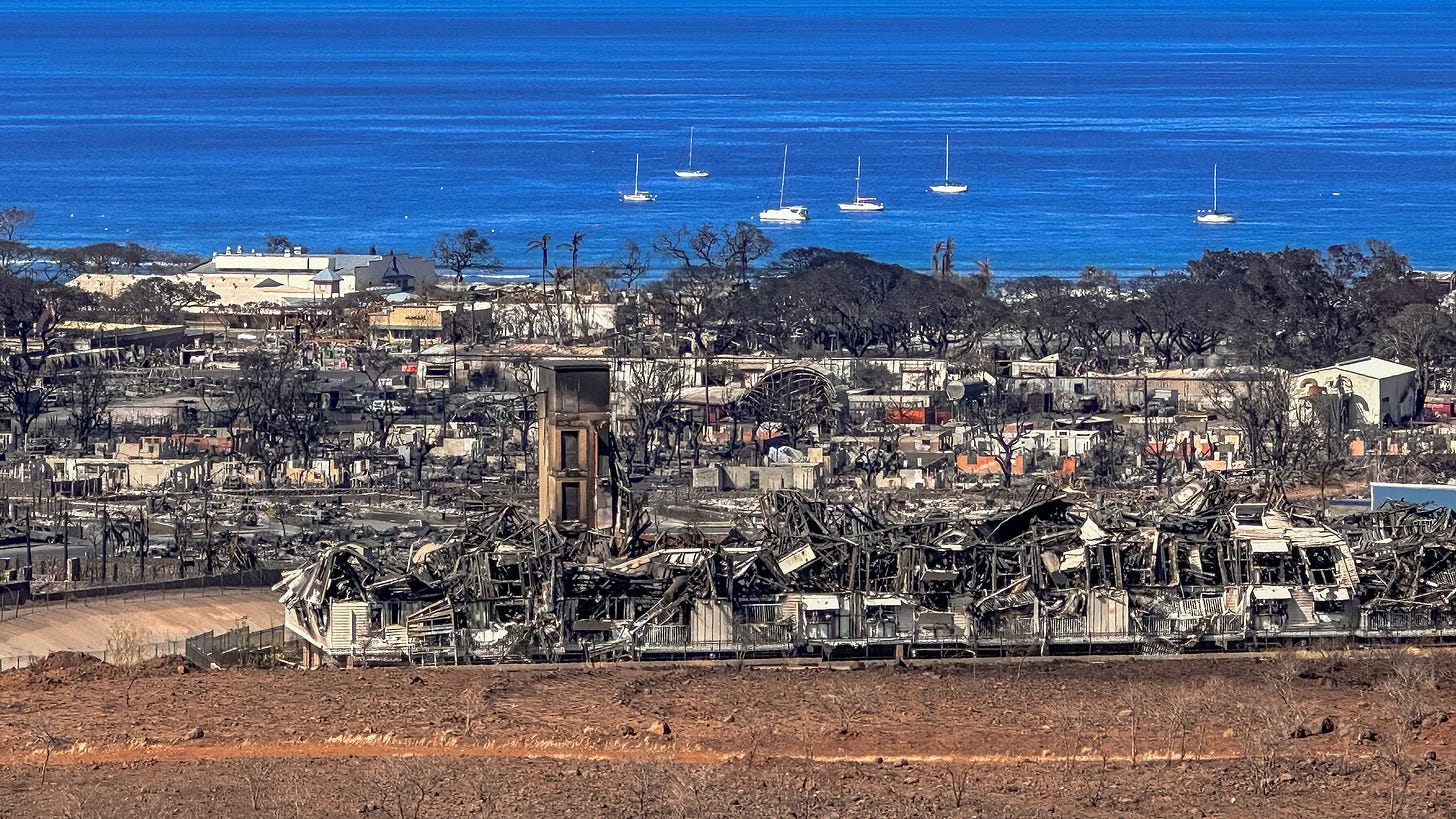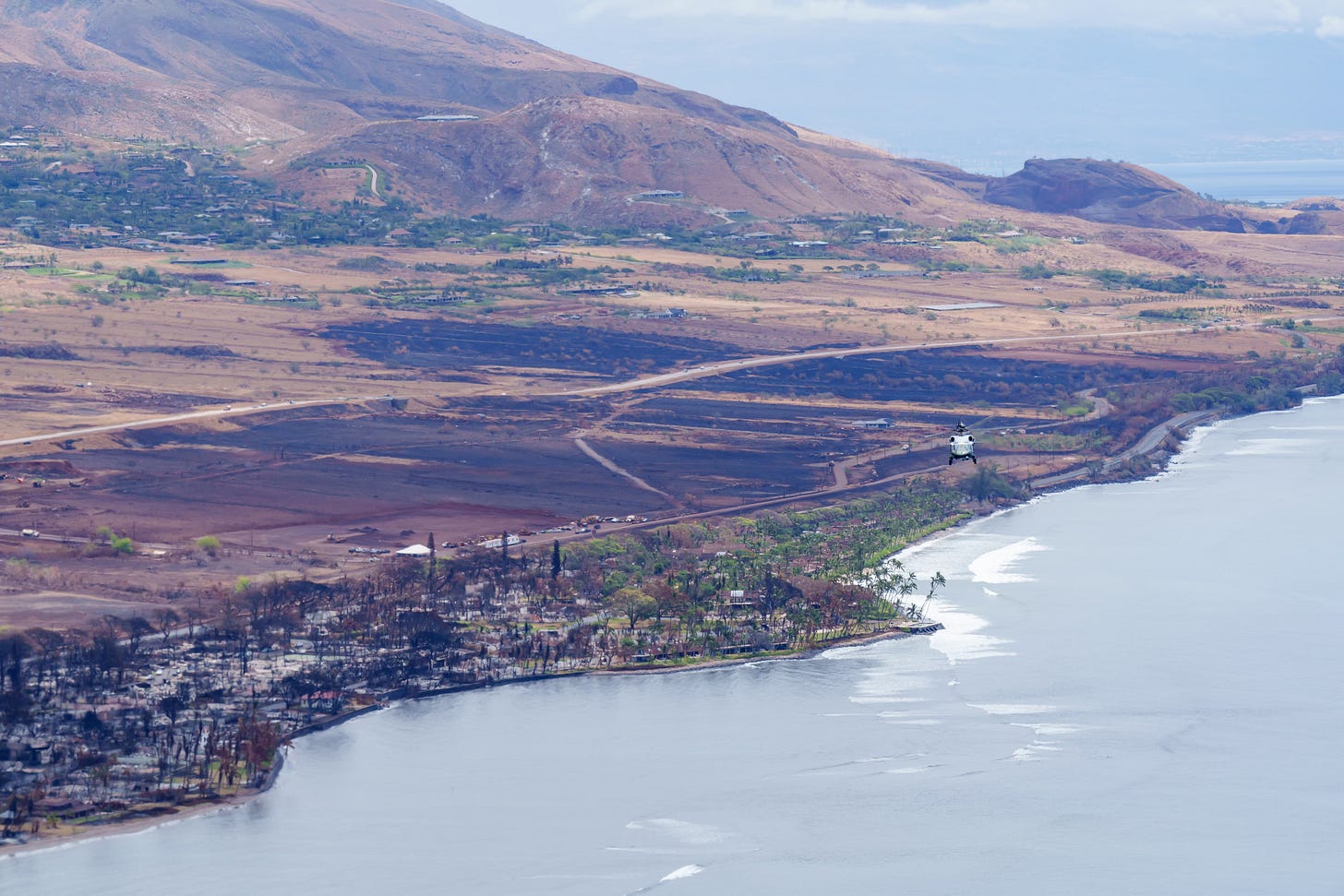"Hawaiʻi will not be deterred" from suing Big Oil
Facing record-breaking fires and floods, and now attacks from the Trump administration, the state is suing oil companies to make them pay for a “decades-long campaign of deception.”

Less than a day after the Trump administration filed a lawsuit aiming to stop Hawaiʻi from taking oil companies to court for their role in the climate crisis, the state last week became the 10th in the country to do just that.
Hawaiʻi’s lawsuit accuses ExxonMobil, Chevron, Shell, BP, ConocoPhillips, and other oil companies of a “decades-long campaign of deception” and ongoing greenwashing campaigns designed to bury the link between their fossil fuel operations and climate change.
The case comes nearly two years after one of the deadliest wildfires in modern U.S. history killed more than 100 people and caused $5.5 billion in damage in Lāhainā, on the island of Maui, incinerating homes and sacred sites in what was once the capital of the Hawaiian Kingdom. In 2020, Maui County and the City and County of Honolulu filed separate lawsuits against many of the same companies to recover the local costs of rebuilding and adapting to climate disasters, including wildfires, heat waves, floods, rising seas, and public health threats.
Hawaiʻi’s statewide lawsuit, filed by Attorney General Anne Lopez, seeks to collect damages on behalf of communities across the entire state — and it also brings consumer protection claims under state law.
“The climate crisis is here, and the costs of surviving it are rising every day,” Hawaiʻi Governor Josh Green said in a statement announcing the lawsuit. “The burden should fall on those who deceived and failed to warn consumers about the climate dangers lurking in their products. This lawsuit is about holding those parties accountable, shifting the costs of surviving the climate crisis back where they belong, and protecting Hawaiʻi citizens into the future.”
The fossil fuel industry “had a duty to warn people about the climate dangers associated with their products, or to mitigate those dangers. But they did neither of those things,” Lopez said. “Instead, they put profits ahead of people and facilitated the increased use of their dangerous products through decades of deceptive conduct. They violated Hawaiʻi law, harmed all Hawaiʻi residents, and will now be held accountable in a Hawaiʻi court.”
One day earlier, Lopez and Green were each named as defendants in a “highly unusual” lawsuit brought by the Department of Justice after Green told a local news station that Hawaiʻi was planning to sue fossil fuel companies later that week. The DOJ’s lawsuit — derided by legal experts as an “intimidation tactic” — claimed the state’s then not-yet-filed climate case would interfere with the federal government’s authority to regulate emissions, even as the Trump administration takes various measures to undermine that authority.
“The Department of Justice is working to ‘Unleash American Energy’ by stopping these illegitimate impediments to the production of affordable, reliable energy that Americans deserve,” said U.S. Attorney General Pamela Bondi in a statement on the lawsuits citing Trump’s April executive order that targeted state climate actions.
The Justice Department also sued the state of Michigan, which announced its plans to file a climate deception lawsuit against oil companies last year. But Michigan Attorney General Dana Nessel said she was “undeterred in my intention to file this lawsuit the President and his Big Oil donors so fear.”
Richard Wallsgrove, an associate professor and director of the Environmental Law Clinic at the University of Hawaiʻi, said that “if the intent was to threaten and quiet down [Hawaiʻi], then I think the appropriate response is to be even more loud and vocal about it, and I think that’s what the Governor and the Attorney General did.”
Lopez called the administration’s actions “deeply disturbing” and “a direct attack on Hawaiʻi’s rights as a sovereign state,” adding that “The state of Hawaiʻi will not be deterred from moving forward with our climate deception lawsuit.”
In contrast, two days after the Justice Department’s court filings, Puerto Rico voluntarily dismissed its own climate deception lawsuit against oil companies without explanation. The move came after the pro-fossil fuel American Energy Institute urged Puerto Rico’s recently elected governor, Jenniffer González-Colón, to order the Commonwealth’s top legal officer to withdraw the complaint.
The Trump administration has since filed lawsuits against New York and Vermont for their climate superfund laws, which aim to make oil companies pay into a state fund for climate adaptation. Those lawsuits also claim the states’ efforts are preempted by federal regulatory authority under the Clean Air Act.
It’s unclear what the future of the Trump administration’s lawsuit against Hawaiʻi will be, now that its case has been filed. Michael Gerrard, director of the Sabin Center for Climate Change Law at Columbia University, said the administration’s case would “become moot, and the DOJ will then have to follow the usual procedure and move to intervene” in Hawaiʻi’s suit. But Wallsgrove said the Department of Justice would likely just amend its complaint, which he called “reckless and dishonest,” to address Hawaiʻi’s existing lawsuit.
Hawaiʻi’s case against Big Oil
Hawaiʻi’s lawsuit argues that oil companies knew about the “increasingly catastrophic injuries to the State and its property, infrastructure, and natural resources,” and to “the health, safety, and wellbeing of the State’s residents” resulting from the use of fossil fuels — but lied about that link for decades in order to protect its profits.
State Representative Ikaika Hussey, who represents communities in Honolulu, said Hawaiʻi — and particularly its Indigenous and Pacific Island communities — are now facing extreme and ever-compounding challenges as a result. “We’re concerned that we’re going to have to move whole communities because of sea level rise,” he said. “There’s a large Pacific Island population, a lot of whom themselves are climate refugees, who have essentially played no role in the climate problem but are the very first to experience the impacts.”
The state has two real options for funds when it comes to recovering from climate disasters and building infrastructure that can withstand them in the future, said Hussey: “one is us, finding ways to raise money from our own community. But I believe strongly that we should go after the major polluters, which have engaged in what I believe are highly illegal actions dating back decades where they essentially lied to the public about the impacts of climate change and their role in propagating it.”
Hawaiʻi’s lawsuit comes as Trump rescinds disaster relief programs and pulls back FEMA funding that was already strained by increasing climate disasters and disproportionately disbursed along lines of race and class.
The state’s lawsuit seeks to make the companies pay damages, disgorge profits made through deceptive practices, and cease any deceptive conduct, among other remedies.
“Many of the oil companies who have funded a lot of the disinformation around climate science, and who advocated and lobbied against climate policies, have taken really no responsibility,” said Hawaiʻi’ Senator Chris Lee, who represents communities on the island of Oʻahu. “We have records that they knew decades ago that what they were doing was directly facilitating the climate changes we’re now experiencing, yet they did nothing about it and took steps to further mislead the public. We have an obligation to the residents in our state to take action and make sure that those that are contributing to those impacts that are directly affecting peoples’ lives here are doing their part to help address the situation.”
The lawsuit also says the companies violated the public trust doctrine in Hawaiʻi’s Constitution, which protects public resources for present and future generations as well as the rights of Native Hawaiians. A recent lawsuit brought by Hawaiian youth against the state’s Department of Transportation under the public trust doctrine resulted in a settlement agreement to cut transportation emissions by 2045.
The Trump administration’s lawsuit against Hawaiʻi had claimed that the anticipated case would seek to regulate emissions and would therefore be preempted by federal law. But Hawaiʻi’s complaint explicitly states that the state “does not seek to impose liability on Defendants for their direct emissions of [greenhouse gasses] and does not seek to restrain Defendants from engaging in their lawful business operations.”
Oil companies have made similar arguments against other climate deception lawsuits. In January, the Supreme Court turned down a request by fossil fuel defendants to hear arguments on the issue in Honolulu’s lawsuit — putting that case back on track to become one of the first climate deception lawsuits to reach trial.

“My town is gone”
Hawaiʻi’s complaint notes that wildfires have caused “incalculable loss to Hawaiʻi communities,” including the emotional toll on survivors who’ve lost loved ones, homes, and cultural sites that existed long before the Kingdom of Hawaiʻi was colonized and overthrown.
All of that is true for Pāʻele Kiakona. Pāʻele’s family are taro farmers and fishermen, and have lived on the islands for thousands of years to see their land and livelihoods forever altered by sugar plantations, tourism, and now, fossil fuel-driven climate change.
Pāʻele narrowly escaped the 2023 wildfires with his family after spending most of his life in Lāhainā.
“Overnight, my town is gone,” he said. “Everything I knew, everything I grew up in and around, what has given me character and some of what my identity is centered around, is just gone in a day.”
The day after the fires, Pāʻele traveled into town on his dirt bike in search of family members he hadn’t yet heard from. “I saw bodies just laid out on the floor because they couldn't escape the flames,” he said. “They overheated, they collapsed, they just couldn’t make it out. One of my really good friend’s parents both perished in their car. They were just holding on to each other in the car, and that's how they were found the next day.”
After the fires, Pāʻele helped reignite Lāhainā Strong — a local organization that has fought for funding and legislation to help people in the community, many of whom were left without a place to live, to recover and rebuild.
While there is not yet a specific attribution study to show the link between climate change and the Lāhainā fires, other studies have tied increased wildfires to conditions made significantly worse by climate change and even specific fossil fuel companies’ emissions. “Anybody who’s tracking the general evolution of climate science knows that this was what was predicted,” said Wallsgrove. “The attribution is certainly established enough to file a lawsuit, and the lawsuit will help us to further this investigation into who’s culpable and to what degree.”
Pāʻele said he was “one hundred percent in support of accountability.”
“If we have enough evidence and data to prove that certain entities or institutions have had a profound effect on our environment, and it shows, then those who contribute to that should be held accountable,” he said.

Can your organization help me to restore daudi karanja indigenous land in mairi village kigumo sub-county muranga kenya this year 2025
Rex Tillerson...COULD STOP A LOT OF CRAP N BULL..N SUFFERING..BY STEPPING UP.